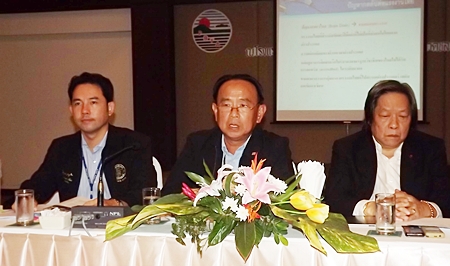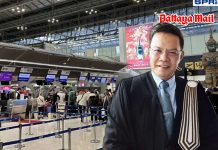A provincial labor official warned Pattaya tourism businesses to begin planning now for changes to come in 2015 with the launch of the Association of Southeast Asian Nations common market.
Speaking at the March 14 Pattaya Business & Tourism Association, Chonburi Labor Office analyst Yuwaree Satayaphanit told business leaders that once labor-law liberalizations take effect, local businesses will face greater international competition. PBTA president, Wiwat Pattanasin countered, however, that Pattaya has nothing to fear.
 (L to R) Mayor Itthiphol Kunplome, PBTA president Wiwat Pattanasin, and PBTA consultant Jamroon Vitsavachaipan meet with the members of Pattaya’s business community to discuss the upcoming ASEAN common market.
(L to R) Mayor Itthiphol Kunplome, PBTA president Wiwat Pattanasin, and PBTA consultant Jamroon Vitsavachaipan meet with the members of Pattaya’s business community to discuss the upcoming ASEAN common market.
“The opening of the ASEAN market and freedom of labor movement coming in 2015 will have direct affects on tourism, but Pattaya is already competing with international markets, so there is nothing to worry about,” he said. “Freedom of labor movement will motivate entrepreneurs in Pattaya.”
As part of the new common market, workers in seven professions will be freed of the constraints Thailand’s restrictive work-permit laws place on foreigners trying to work in the kingdom, even for non-Thai companies. Professionals in engineering, nursing, architecture, surveying, medicine, dental and accountancy will be able to work in any ASEAN member country. In addition, the organization is considering adding the tourism sector to its list of labor liberalizations.
“Since Pattaya is an important tourism destination for Thailand, the city has to adapt and prepare for entering the ASEAN Community and its freedom of labor movement now,” Yuwaree said.
“It is vital that business owners research information and start developing their businesses to prepare for the changes by improving skills to deal with the increased competition and focus on improving their personnel’s training because once the ASEAN Community is open, member countries can trade freely and boost competition with less need to rely on third-world markets,” she warned.
For tourism, the challenge comes from international companies that can bring in employees that are better trained, more educated and more customer friendly than Thais, who have been protected by draconian labor laws that bar foreigners from working in many occupations.
“It must be admitted that alien workers will have an effect on the country,” Wiwat said. He urged the government to clarify quickly what the new rules will be and to assist the private sector with adjusting to the new competition.




